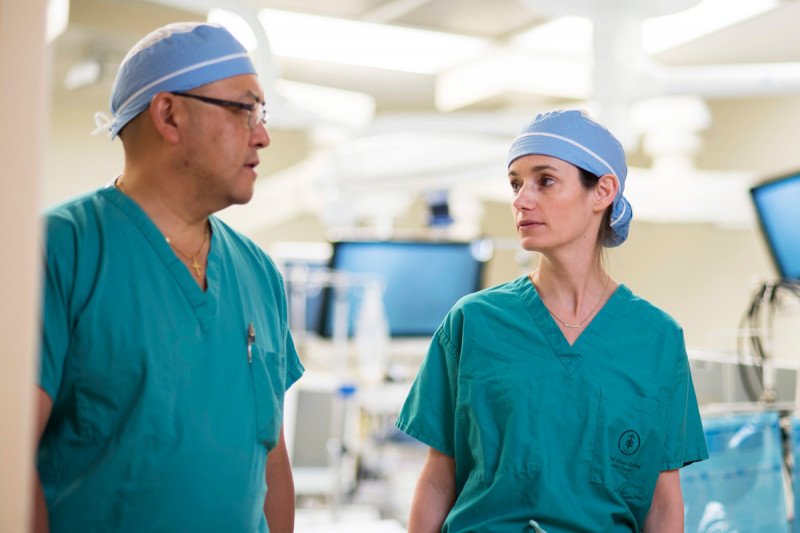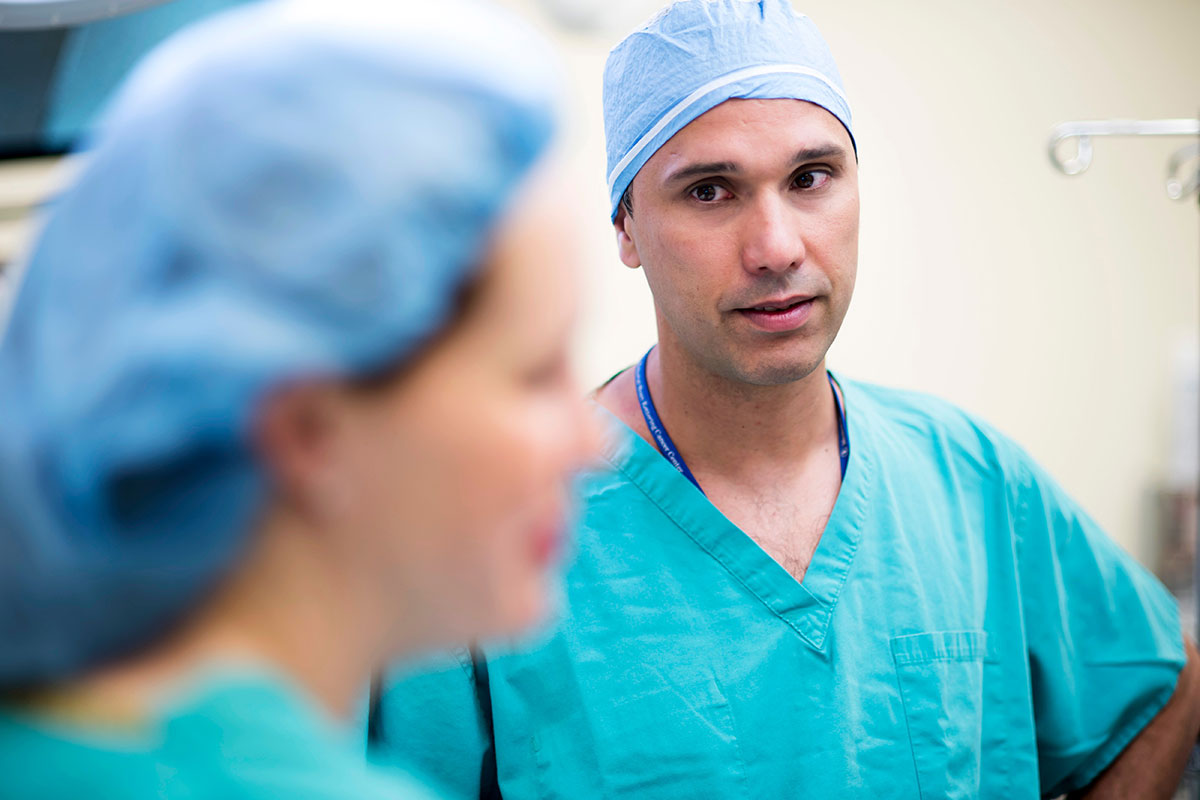

Surgery is the main treatment for ovarian, fallopian tube, and peritoneal cancer at Memorial Sloan Kettering. It’s used for women with early and advanced disease, as well for women whose cancer has come back after treatment.
The type of surgery you receive depends on several factors, including the type and stage of your cancer, your general health, and whether you plan on having children in the future. Our doctors are experts at choosing the best surgical approach to treat your cancer while preserving your quality of life.
Types of Surgery
If you have early-stage ovarian cancer, meaning that the tumor does not appear to have spread beyond the ovary, one option to remove the cancer is a traditional open surgery, called a laparotomy. A laparotomy involves making a relatively large incision in the abdomen.
In many cases, we recommend a minimally invasive laparoscopy procedure that’s done through smaller incisions.To perform laparoscopy, we insert a small video camera into the abdominal area through an endoscope (a device with a light at the end), and the surgical team guides the camera within the body. For early-stage tumors, you might have a laparoscopy done to:
- remove one of the fallopian tubes and ovaries along with the omentum, a thin fold of abdominal tissue that encases the stomach, large intestine and other abdominal organs. (This procedure is called an omentectomy.) Lymph nodes may also be removed.
- explore the abdomen for additional cancer and evaluate the extent of the disease
- drain any fluid buildup in the abdominal area
- retrieve small samples of abnormal tissue to perform a biopsy
- determine if you might benefit from debulking (removal of as much of the tumor as possible) and chemotherapy.
Our experts sometimes consult with MSK thoracic surgeons to use minimally invasive VATS for help in evaluating and treating ovarian cancer. VATS is used when there is fluid in the chest and our surgeons want to see if there is also solid tumor there that has spread from the abdomen. In this procedure, we insert a tiny video camera into the chest through an endoscope (a device with a light at the end). This allows us to explore the region, identify potential tumors, and remove tissue for biopsy. We also use VATS to drain any fluid build-up in the chest and see if you might benefit from removal of tumors through minimally invasive methods.
Our specially trained surgeons often perform robotically assisted minimally invasive surgery to biopsy or treat early-stage ovarian cancer and, in some cases, recurrent ovarian cancer. To perform robotic surgery, the surgeon uses finger and foot controls, and the robot precisely copies his or her every movement. The surgical team at the bedside monitors you throughout the procedure, assisting as necessary. Studies suggest that if you have a robotic procedure with an experienced surgeon, you are likely to experience less postoperative pain, recover faster, and have good cosmetic results.
If your cancer has spread beyond the pelvis, MSK surgeons will attempt to remove all the affected tissue during surgery. Depending on how much the cancer has spread, your surgeons may need to take out parts of the omentum, the diaphragm (the thin muscle below the lungs and heart that separates the chest from the abdomen), and segments of the bowel, the spleen, and parts of the liver.
With an approach called tumor debulking, also known as cytoreduction, we remove as much cancerous tissue as possible to boost the effectiveness of chemotherapy in reaching and destroying cancer. The procedure usually involves removing the ovaries as well as the uterus, cervix, fallopian tubes, and any other areas containing diseased tissue. The goal is to leave no visible tumor behind.
If your cancer comes back (recurs), you may benefit from a second debulking operation, depending on how long the disease has been in remission and in what locations the cancer has returned.
For certain younger women, we may consider an approach that preserves fertility by finding ways to keep a normal ovary intact, as well as the uterus. As long as the cancer is at a very early stage it’s sometimes possible to remove only the affected ovary (called unilateral oophorectomy) and fallopian tube, omentum, and lymph nodes preserving other pelvic organs necessary for fertility. Our surgeons are highly skilled in these methods to preserve fertility, as well as in knowing when such an approach might be right for you. The key consideration on our minds is always which technique is best for curing your cancer and giving you a normal life afterward.
Side Effects of Ovarian Cancer Surgery
Surgery for ovarian cancer can cause some pain and tenderness in the area where the operation occurred. These symptoms can usually be controlled well with pain medication. Symptoms of menopause, including hot flashes or vaginal dryness, also may arise soon after the surgery. These symptoms can usually be alleviated with specific therapies.
Why Choose Memorial Sloan Kettering for Ovarian Cancer Surgery?
Women who come to MSK for ovarian cancer treatment receive compassionate, leading-edge care from a team of world-renowned ovarian cancer surgeons. We provide personalized care to reach the best possible outcome while minimizing side effects.
- Our surgery patients benefit from the vast experience of a team that performs hundreds of operations for ovarian cancer each year. Studies have repeatedly shown that patient survival is improved at institutions where surgeons do a high number of operations.
- When possible, we use minimally invasive surgery to determine the stage of early disease. This means there are smaller incisions that heal more quickly.
- The ovarian cancer surgery team at MSK is the nation’s only group dedicated solely to the surgical treatment of all types and stages of ovarian cancer. Due to our expertise in radical debulking surgery, more than 90 percent of the women undergoing surgery for ovarian cancer at MSK have very little tumor remaining after the procedure. This leads to much better outcomes.
- We now perform many procedures at the Josie Robertson Surgery Center, a state-of-the-art facility for short-stay cancer surgery. This allows our patients to return home to complete their recovery either the same day as surgery or the next.
- Our surgical outcomes and survival rates are among the best in the world. Our methods have been adopted internationally by other centers to achieve these outstanding results.
- We tailor the surgical procedures we use to provide the best outcomes. This means selecting minimally invasive laparoscopy, robotic surgery and video-assisted thoracic surgery when appropriate.
Section of Ovarian Cancer Surgery
To enhance the surgical care we provide for our patients with advanced ovarian cancer, Memorial Sloan Kettering has formed the Section of Ovarian Cancer Surgery. This highly specialized program, led by Dennis Chi, is composed of a team of five surgical experts. Each doctor brings a particular area of focus and expertise for treating advanced ovarian cancer.
Research has shown that women with advanced ovarian cancer do better when treated by a dedicated surgical team supported by a highly specialized center that cares for a large number of people with this disease. Members of our expert team collaborate closely with other specialists who provide chemotherapy, targeted therapies, and other treatments when appropriate for each person.
The Section of Ovarian Cancer Surgery’s primary aim is to deliver the best possible care. Beyond that, we are deeply committed to advancing the field of ovarian cancer research and treatment. For example, we are developing an algorithm that will help us decide whether women with advanced ovarian cancer are best treated with primary debulking surgery, laparoscopic evaluation (to determine whether surgery is advisable), or neoadjuvant chemotherapy.
In addition, our team is dedicated to conducting clinical trials. Our goal is to implement novel approaches that will continue to improve upon our already successful outcomes and preserve quality of life during and after treatment.
We’re available 24 hours a day, 7 days a week







